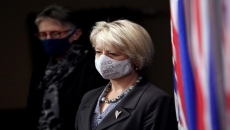A support group for families of people who have fatally overdosed is expanding its services across the country to also help those whose loved ones are addicted to illicit drugs.
The Alberta chapter of Moms Stop the Harm has received $345,000 in federal funding over two years to launch the Stronger Together Canada project from Alberta to all other provinces except B.C., which has already established its own program with provincial funding.
As we mark the sombre five-year anniversary of British Columbia’s overdose emergency, I want to acknowledge the pain that far too many people feel today and extend my most heartfelt condolences to all those who are grieving.
— Sheila Malcolmson (@s_malcolmson) April 14, 2021
Stronger Together B.C. includes two groups: Healing Hearts for people grieving the overdose death of a family member to substance use and Holding Hope for those connected to someone in active addiction.
The B.C. model, which includes input from families and Indigenous communities that are disproportionately affected by the overdose crisis, is being used in Alberta to establish the larger program for the rest of the country.
Helen Jennens, a Moms Stop the Harm spokeswoman in Kelowna, B.C., says the group that began in 2015 with three mothers from B.C. and Alberta has seen a 25 per cent increase in membership in the last three months.
Jennens, whose two sons died of overdose, says the two Stronger Together B.C. groups are led by volunteer facilitators with lived experience.
"We also had a doctor come and talk to us and we've had an ex-coroner come and talk to us," she says.
Jennens says facilitators will receive training to lead each group that will meet online during the pandemic to ensure people in remote communities get help while in crisis.
Half of the 2,000 members of Moms Stop the Harm across the country are from B.C., where over 7,000 drug users have died of overdose since 2016, when the province declared a public health emergency.
Jennens says provincial funding provided last year has helped the group produce a guidebook for facilitators, pay for online accounts and hire someone to organize the groups.
The BC Coroners Service reported a record 1,716 annual deaths last year as border closures during the pandemic disrupted the usual flow of illicit drugs and more toxic fentanyl-laced substances took their place.
British Columbia and the City of Vancouver are asking the federal government to decriminalize small amounts of drugs for personal use as one way to reduce stigma for people needing treatment.






